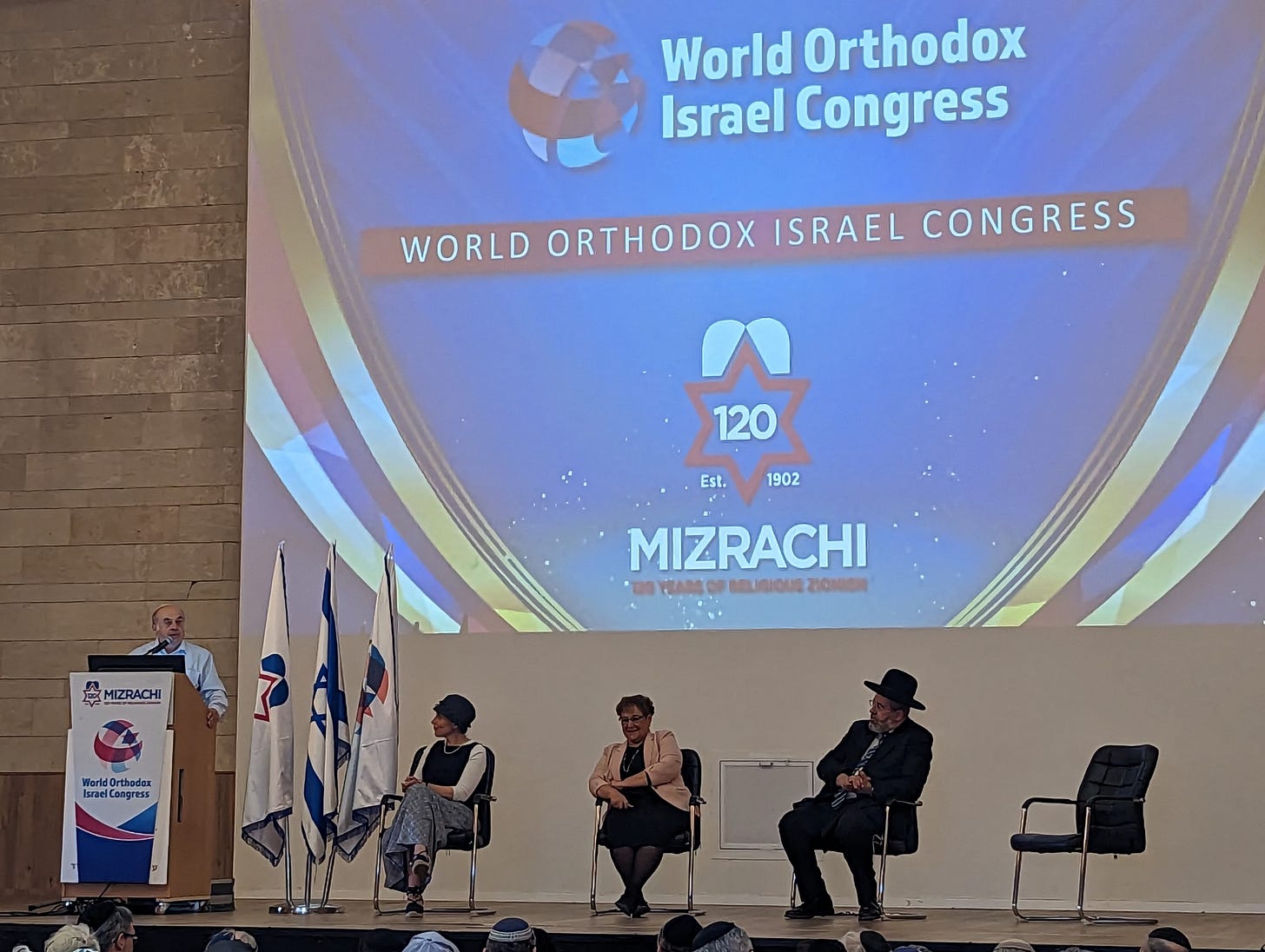Storks, Chicks and Refuseniks
Reflections on the first World Orthodox Israel Congress
I spent much of the last 24 hours at the first World Orthodox Israel Congress, arranged by Mizrachi. It’s an extraordinary event; 1300 rabbis, educators and lay-leaders from around the world. I’m not sure whether I was invited as a representative of the Biblical Museum of Natural History or as a representative of Rationalist Judaism, but either way, I was thrilled to participate. (I was also honored when a certain black-hatted rabbinic leader with a very prestigious position came over to me and said that he enjoys reading my blog!)
At last night’s opening gala dinner, during a wonderful presentation by Chief Rabbi Ephraim Mirvis of the UK, he mentioned something that bothered me a little. He discussed how the stork, a bird that I had observed just a few hours earlier during its annual migration over Beit Shemesh, is called chasidah in Hebrew, which literally means “the kind one.” Rabbinic sources state that it is so called because it is kind to its friends; yet if that is the case, why is it a non-kosher bird - especially since, as Ramban says, birds are rated as non-kosher for being savage? The answer given is that the stork is only kind to its own kind, and not to others. Rabbi Mirvis presented this as a lesson about the importance of inclusivity and goodwill towards those who are not like us.
Some people at my table asked me if this is actually true about storks (the answer is that storks are exactly the same as all birds in only being kind to their own chicks, and are probably called chasidah for a different reason), but that’s not really important. My question is whether it is indeed fair to present this as a Torah value. After all, there are certainly limits to the Torah’s inclusivity, especially with regard to non-Jews. So what’s the value in talking about being inclusive, if you just draw the line a little further out?
After today’s program, however, I think I figured out the answer.
The day started with a plenary session in which we were addressed by Chief Rabbi David Lau, Miriam Peretz, Natan Sharansky, and Rabbanit Shani Taragin. Sharansky - one of my personal heroes - also spoke about inclusivity. He described how when he was imprisoned, the differences between various types of Jews were utterly meaningless to him, and that’s how it should always be.
As he said this, I realized that the plenary itself was astonishingly inclusive. I haven’t attended any Agudas Yisrael conventions (though I’ve been publicly condemned at one), but I’m pretty sure that the men who attend only hear speeches from other frum men. Meanwhile, the Chief Rabbi’s speech was followed by speeches from two women, and while Sharansky wore a kippah, he is not Orthodox.
It’s true that Mizrachi would presumably not have a Reform rabbi address the audience (though I think I did see a female rabbi in attendance). Yet after all, it is officially the World Orthodox Congress. But there’s a further point to be made.
Every system has its boundaries. Even Jewish frameworks which are open to Conservative and Reform are generally closed to Jews For Jesus. But there is still a significant difference between people who are striving to be inclusive - within the boundaries of what can be done without undermining the framework - and those who are not, or who are looking to perform ideological purity tests and find reasons to disqualify people.
Is there any adequate reason why women cannot have their picture appear in print, or speak before male audiences? I’m not saying that I don’t understand the sensitivities - I do - but it has to be weighed against the very serious cost of excluding them. Likewise, I understand why people might not want to hear presentations from someone of lesser religious affiliation, but if they are not saying anything against their religious beliefs, is that adequate reason to exclude them? If Moshe Rabbeinu could get useful guidance from a Midianite priest, surely we can get useful guidance from people outside of our community!
Kudos to Mizrachi for arranging this spectacular and momentous event, and for showing that Orthodoxy can try to be inclusive rather than exclusive.




"within the boundaries of what can be done without undermining the framework" - this my main contention with this blog. Pointing out (in other posts) certain Charedi inconsistencies, beliefs and even unhealthy attitudes - without recognizing that they serve to uphold a larger ethos - is damaging. For example, Rav Gershon Adelstein saying Bein Hazmanim causes more accidents b/c of a lack of learning is productive to the entire enterprise of Judaism from the macro level because his followers take it seriously. Reducing all the charedi-idms as this blog does undermines the framework. If you notice it, leave it alone (most of the time.) I won't be teaching my kids theistic evolution unless its necessary.
It's been noted before that the loudest calls for "diversity" usually come from the *least* diverse and most homogenous people in the country. Vermont voters, Reform Jews, etc. So be careful who you make common cause with.